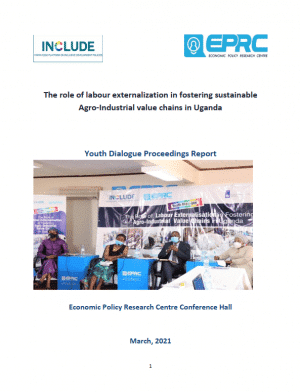
The report shows that due to few decent wage employment opportunities in Uganda, young people take up vulnerable jobs and are compelled to seek for employment opportunities in the Middle East. The government of Uganda has streamlined labour export by facilitating registration of over 100 labour agencies, fast tracking verification of jobs abroad and plans to revise of the 2011 National Employment Policy. Labour externalisation is beneficial in terms of skills development, remittances and investments back home. These benefits can be enhanced by developing channels for workers abroad to invest back at home, strengthening pre-departure training and orientation to prepare those heading abroad for jobs, facilitating the formation of associations for migrant workers to pool together their resources, emphasising on skills acquisition that migrant workers can apply at home upon their return.

